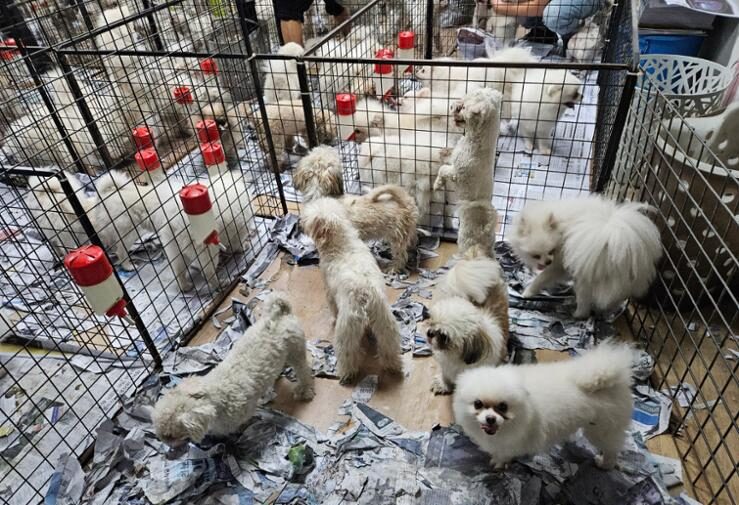WNAM MONITORING: A proposed bill aimed at cracking down on puppy mills, where dogs are often bred in cramped and unsanitary conditions for sale, has sparked mixed reactions from both animal rights activists and dog breeders.
Activists strongly support the bill, which aims to eliminate the third-party dealer chain in Korea’s pet industry, believing it could effectively end the unethical practice by breeders who keep animals constantly pregnant in unsanitary conditions. However, dog breeders oppose what they perceive as an excessive ban, arguing that it infringes on their freedom of occupation. Consequently, they are advocating for alternative measures.
Commercial pet shops are the most prevalent channels for acquiring companion animals in Korea, where nearly 15 million people have at least one pet, with 11 million owning dogs.
Many dogs sold in those shops are sourced from puppy mills. In these facilities, female dogs are often confined in filthy cages, subject to constant pregnancies. And the puppies born there are traded at mass auction houses.
Many puppy mills, including legally registered ones, operate in substandard conditions due to legal loopholes and inadequate government monitoring. Puppies just days old are often traded at auctions, despite the Animal Protection Act, which prohibits the sale or adoption of dogs under 60 days old.
Under the proposed law, cats and dogs aged under six months can no longer be sold by a pet shop or commercial dealer unless they have bred them. Animal trade at mass auction houses will be banned, implying that individuals must obtain pets directly from licensed breeders or adopt them from rescue centers.
Additionally, if enacted, the law will prohibit breeders from subjecting dogs and cats aged 60 months or older to pregnancy and from breeding more than 100 canines in a single facility.
The proposed bill is similar to the “Lucy Law” introduced in the United Kingdom in 2019. The law was named after Lucy, a Cavalier King Charles Spaniel who was rescued from a puppy farm in 2013, where she endured cruel treatment, serving as a breeding dog throughout her entire life.
Korea Animal Rights Advocates (KARA), one of the biggest animal rights group here, urged the swift legislation of the bill.
On the other hand, dog breeders and pet shop owners have voiced strong objections, arguing that what they describe as a malicious law will result in the collapse of the whole pet industry.
“Auction houses serve as not only a marketplace between breeders and pet shop owners but also as a venue for communication and exchange information about the market,” a coalition of the owners of those businesses said in a statement in late January.
They also emphasized that the ban on auction houses could lead to the creation of black markets and called for alternative measures such as coming up with guidelines for auction business owners.


